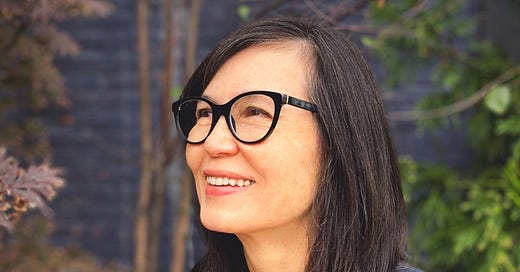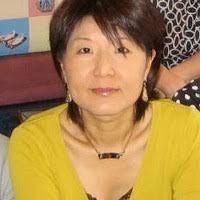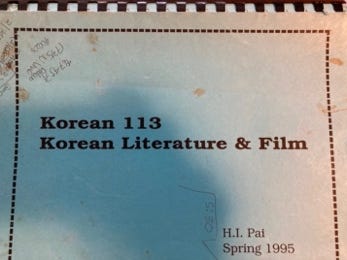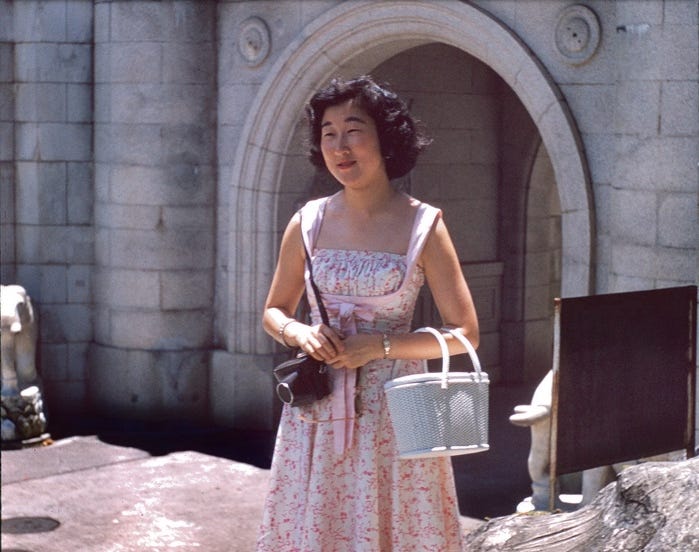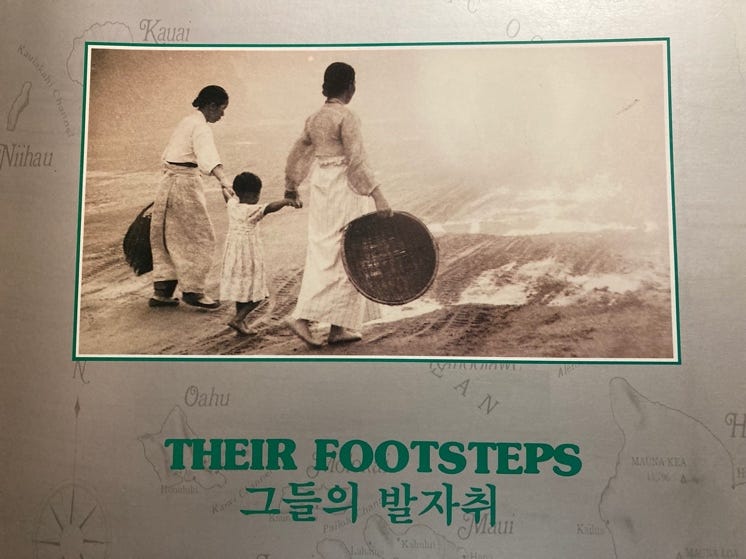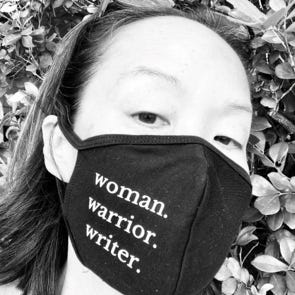Meet Woman Warrior Writer Grace Cho
January (2022) Woman Warrior Writer is Grace M. Cho. Cho is the author of Tastes Like War (2021), a finalist for the National Book Award for Nonfiction, and Haunting the Korean Diaspora: Shame Secrecy and the Forgotten War (2008), which won the American Sociological Association’s Asia and Asian America Section book award in 2010. She lives in New York City with her partner, kids and chosen family, and she teaches sociology at the College of Staten Island, City University of New York.
How did you come to author your life?
My former teacher, the incomparable bell hooks, wrote in Theory as Liberatory Practice, “I came to theory desperate, wanting to comprehend—to grasp what was happening around and within me.” Writing for me has always been about theorizing, about theory as “a location for healing.” As a young adult, I began writing to make sense of all the injustices my mother faced, all the ways in which her history had been obscured or erased or made into an object of shame and contempt. As her daughter, it became my business to denounce that shame and celebrate her legacy.
WOMEN WRITERS TO READ
I’ve had the honor to host many women writers who have inspired students with their words and wisdom. Make these authors part of your community conversation. Read their work!
Guest writers to women’s creative writing workshops have included:
Emily Bernard, Shonda Buchanan, Marivi Soliven, Wendy Chin-Tanner, Susan Muaddi Darraj, Debra Kang Dean, Amanda Fletcher, Veronica Golos, Gail Vida Hamburg, Vanessa Hua, E.J. Koh, Maya Shanbhag Lang, Devi S. Laskar, Jenna Le, Anne Liu Kellor, Vanina Marsot, Tamiko Nimura, Ishle Yi Park, Nahid Rachlin, Ivelisse Rodriguez, Anjoli Roy, Renee Simms, Grace Talusan, Camille Wanliss.
Register now for WINTER 2022 CLASSES
FREE CLASS Master Narratives January 6 THURSDAY 2-3PM (HST)
This one-off class explores Master Narratives. Open to new students only.
Asian/Asian American Women’s Creative Writing Workshop January 12-March 16 WEDNESDAYS 2-4PM (HST)
- Caroline Kim (The Prince of Mournful Thoughts and Other Stories)
- Anjali Enjeti (Southbound)
- Darien Hsu Gee (Other Small Histories)
Guests: Anjali Enjeti and Darien Hsu Gee
Intersectionality: Manuscript Workshop January 18-March 22 TUESDAYS 12-2PM (HST)
- Toni Ann Johnson (Homegoing)
- Caroline Kim (The Prince of Mournful Thoughts and Other Stories)
- Carmen Machado (In the Dream House)
Guest: Caroline Kim
Intersectionality: Manuscript Workshop is admittance by instructor permission only. Please contact me writer@drstephaniehan.com
Women’s Creative Writing Workshop February 3-March 7 THURSDAYS 8-10AM (HST)
- Toni Ann Johnson (Homegoing)
- Darien Hsu Gee (Other Small Histories)
Guests: Toni Ann Johnson and Gail Vida Hamburg
Break: Write Your Divorce Workshop is a 4-week class THURSDAYS April 7-28 for women who have completed their divorce process and who seek closure, clarity, and understanding through writing their story. This class will cover the Divorce Story Structure as well as explore creative process.
Divorce is an equal opportunity reality: all women can write their divorce story! Community offers opportunities for insight and that writing is a way to truth and understanding.
Divorce is ubiquitous; 25% of all children in the US grow up in single parent households, women are 200 years from gender equity, and yet, there is a huge failure to understand divorce within the larger context of living in a society that does not center women’s bodies.
Ahran Lee will lead art exercises on creativity and self!
Women newsletter subscribers and friends are entitled to a 10% discount on the Break Workshop. Please input the code LOCAL and share the newsletter to a friend in need!
IN MEMORIAM Hyung Il Pai
I learned in mid-December that my former Korean Literature professor from U.C. Santa Barbara Hyung Il Pai died in 2018—the announcement was dated June 12, my mother’s birthday.
Professor Pai was a profoundly influential teacher in my life.
She prompted my sojourn to Korea, and with that, a more serious exploration of my identity within the context of reading. I pivoted to Asia—for answers, for questions, for meaning. She was the only Asian American woman instructor who mentored me with unabashed fairness, frankness, kindness, and intelligence. She demanded a high level of engagement. She had a sense of humor. I’m an outspoken individual; she was never threatened; she never silenced me. She gave her opinions. She avoided subterfuge. She never condescended. She was candid. She was in a different field than I was, took scholarship seriously, and her knowledge base, willingness to challenge accepted frameworks, and sense of purpose, particularly in a field like East Asian Studies which is heavily populated by male scholars, was profound. She was a woman ahead of her time and a woman of her time. She delighted in a growing number of student enthusiasts, but didn’t need a trail of acolytes to satisfy her ego. She knew who she was and moved with refreshing authenticity.
I took her class in 1995, and months later found myself on a plane to Seoul where I lived for a year and a half. I still have the reader from Pai’s class!
Later, she tasked me with going to the library and told me to check out a book on how to make a proper academic CV. She was the only woman professor I ever had who gave me rock bottom advice about employment.
In the run up to the 100th anniversary of Korean immigration to Hawaii she sent me a call for papers. I researched, wrote, and presented. It was well-received by the audience. And then— my paper was denied publication. Information about Syngman Rhee that involved his relationship to my grandmother was controversial. The male scholars demanded I eliminate it to publish.
I refused. Another Korean woman scholar said: “You’ll have to wait until those old men die!”
The paper remains in my hard drive. I started an archive at the University of HI and the paper is the skeleton of a project called ‘Gods and Pineapples’.
In 2002 I was in Foyles in London, wandering around and saw her book Constructing “Korean” Origins A Critical Review of Archaeology, Historiography, and Racial Myth in Korean State-Formation Theories on the shelf. I realized that was the book she had been working on when I was a student. I thought to myself how incredibly long it took to bring that book to publication. I believe knowledge of this kept me in the writing game: Inception to publication of Swimming in Hong Kong was 18 years. I did not have the weight of scholarship behind my book. But Pai was a role model.
Years passed and I lost touch. I was about to contact her because of my mother Marie Ann Yoo’s debut Korea Society photography exhibit The Feeling of Han: Portraits of Post-War Korea 1956-1957 and get Pai’s opinions about the images as well as the many museums in Korea (case-sensitive password: Koreasociety). I think she would have liked to have seen these photos.
I sit here in Hawai’i, several years after the death of Pai, and think of her as I write and how we spend our lives. What we do is who we are. Thank you to Hyung Il Pai!
READING AND WRITING LESSONS
I write an advice column for THROB The Hawai’i Review of Books. If you have creativity reading/writing questions, email me!
OK, I’m gonna say it. Multiculturalism is still a relevant term, but Polyculturalism is the concept for the 21st century!
Check out Dr. Stephanie Han on youtube.
https://www.youtube.com/user/TheBuddhafun
I’ll be posting beginning on Monday, January 10
RE: polyculturalism. As we question the machinations of politics, gender, race, economics, and diversity across all areas, we can better open our minds if we understand that the very idea of nation is rather new in the long scheme of human existence.
This basic cheat sheet may help you guide your students.
RE: TURN. The TURN is the I-see-the-light twist of the poem. You started at one point in the beginning of the poem, but the TURN pushes you to think and see in new ways!
GODS AND PINEAPPLES
THEIR FOOTSTEPS was produced by the committee organizing the 90th anniversary of Korean immigration to the U.S. in Hawai’i in 1993. This photograph was from my grandmother Salome Choi Han’s home. She had prints made from the original photo for each of her children. The photos discolored; my mother no longer has hers, and I am not sure about the other copies. The committee failed to credit the photo. The photographer is unknown, but my grandmother told me a little about where she found it.
When my mother was working at the Bando Hotel in Seoul in 1956 she had said that there was a nearby photography shop, that was closing. She chose this photo from a box of old photographs in the shop.
It surprised me to know that Grandma would bother to dig through a box of photographs and enjoy its beauty so much that she would frame it and give copies to her children. She was rooted in pragmatism, concerned with social acceptability in her Korean American community, and while she enjoyed travel and lived an extremely independent life as a widow, her appreciation of beauty or the sublime were far different from my mother’s. My mother was driven by grace, creativity, and aesthetics. This photo reminds me that art moves all of us and that when we connect to a vision it becomes part of who we are and we are then driven to share as if to say: This is how I see the world. This is who I am. Do you understand what I understand?
WRITERS ENGAGING IN SOCIAL MOMENTS
I met up with Caroline Kim author of The Prince of Mournful Thoughts and Other Stories. This is a wonderful book of short fiction! I highly recommend this book. If you fly over to the most isolated landmass on the planet, give me a shout!
OFFICE HOURS Writing and Coaching
Drop a line if you want to work one-on-one! I’ll help you to reach your goals!
We ruminate like this:
a) I don't believe in timelines.
b) I set goals and then don't make them and feel bad about myself.
c) Goals?
d) I have goals. I have dreams. But nothing ever happens.
I have always set a lot of goals. One summer that included writing a screenplay and doing 1,000,000 sit ups. I wrote that number on my bedroom wall as I decided it would make me feel better to see it. I also outlined the screenplay on the wall. I had visited Faulkner's home and thought this was a good idea. The wall was painted over. I did not do 1,000,000 sit-ups. I did finish the screenplay: ‘Dive for Gold’ about Dr. Sammy Lee the Olympian. It won a UC award. It was never made. He died. The highlight of that effort was I won a free movie pass for a year. I failed to develop washboard abs.
In retrospect, I think this is the deal:
--Goals ideally align with your purpose.
--Goals are best tackled in incremental steps.
--Goals must provoke part of your curiosity. (1,000,000 sit-ups was not something I was ever going to be curious about.)
--Goals are more easily met when you write them down and have someone in your corner who helps you to achieve your goals.
Being the proverbial messenger of bad news/harsh truths that I am, I will also say this:
--In the end we all die.
--Ask yourself if this goal will matter in 5, 10, or 20 years.
If you are stuck with your goals work backwards from DEATH. Ask yourself What do I want to experience in my lifetime and how do I want to leave the world?
MERCHANDISE offer for U.S. newsletter subscribers
Woman. Warrior. Writer. MASK up. Omicron!
I am getting rid of my stock. Buy a single mask ($20) and I will send you two ($40) through January 2022 (or until supplies last). Indicate your choice for a 2 for 1 deal by writing NEWSLETTER in your order!
Questions? Comments? Books you are keen on? Ideas you feel people might benefit from? Contact me at writer@drstephaniehan.com!


